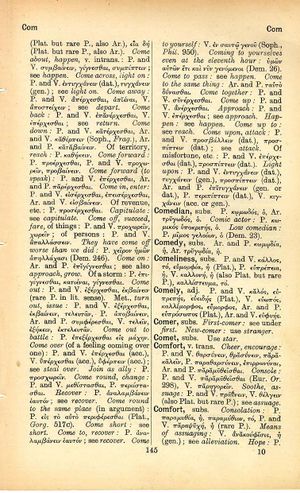comfort: Difference between revisions
καλῶς γέ μου τὸν υἱὸν ὦ Στιλβωνίδη εὑρὼν ἀπιόντ' ἀπὸ γυμνασίου λελουμένον οὐκ ἔκυσας, οὐ προσεῖπας, οὐ προσηγάγου, οὐκ ὠρχιπέδισας, ὢν ἐμοὶ πατρικὸς φίλος → Ah! Is this well done, Stilbonides? You met my son coming from the bath after the gymnasium and you neither spoke to him, nor kissed him, nor took him with you, nor ever once felt his balls. Would anyone call you an old friend of mine?
m (Woodhouse1 replacement) |
m (Text replacement - "ἐπιρρωνύναι" to "ἐπιρρωννύναι") |
||
| Line 3: | Line 3: | ||
===verb transitive=== | ===verb transitive=== | ||
[[cheer]], [[encourage]]: [[prose|P.]] and [[verse|V.]] [[θαρσύνειν]], [[θρασύνειν]], [[παρακαλεῖν]], [[prose|P.]] [[παραθαρσύνειν]], [[ | [[cheer]], [[encourage]]: [[prose|P.]] and [[verse|V.]] [[θαρσύνειν]], [[θρασύνειν]], [[παρακαλεῖν]], [[prose|P.]] [[παραθαρσύνειν]], [[ἐπιρρωννύναι]], [[Aristophanes|Ar.]] and [[prose|P.]] [[παραμυθεῖσθαι]]. | ||
[[console]]: [[prose|P.]] and [[verse|V.]] [[παραμυθεῖσθαι]] ([[Euripides|Eur.]] Or. 298), [[verse|V.]] [[παρηγορεῖν]]. | [[console]]: [[prose|P.]] and [[verse|V.]] [[παραμυθεῖσθαι]] ([[Euripides|Eur.]] Or. 298), [[verse|V.]] [[παρηγορεῖν]]. | ||
Revision as of 09:00, 5 June 2020
English > Greek (Woodhouse)
verb transitive
cheer, encourage: P. and V. θαρσύνειν, θρασύνειν, παρακαλεῖν, P. παραθαρσύνειν, ἐπιρρωννύναι, Ar. and P. παραμυθεῖσθαι.
console: P. and V. παραμυθεῖσθαι (Eur. Or. 298), V. παρηγορεῖν.
soothe, assuage: P. and V. πραΰνειν, V. θέλγειν (also Plato but rare P.); see assuage.
substantive
consolation: P. παραμυθία, ἡ, παραμύθιον, τό, P. and V. παραψυχή, ἡ (rare P.).
means of assuaging: V. ἀνακούφισις, ἡ (gen.); see alleviation.
easy circumstances: P. and V. εὐμάρεια, ἡ, P. εὐπάθεια, ἡ.
comforts, blessings: P. and V. τἀγαθά.
be of good comfort, v.: P. and V. θαρσεῖν, θρασύνεσθαι, V. εὐθυμεῖν (Eur. Cyclops), θαρσύνειν.
go in for greator comfort: P. εἰς τὸ τρυφερώτερον μεθίστασθαι (Thuc. 1, 6).
this one child was the last remaining comfort of my life: εἰς παῖς ὅδ' ἦν μοι λοιπὸς ὀφθαλμὸς βίου (Eur. Andromache 406).

